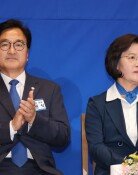Protestants exercise powerful influence over Lee gov`t
Protestants exercise powerful influence over Lee gov`t
Posted February. 24, 2011 10:01,
The ruling Grand National Party will not deliberate a law restricting taxation at this months extraordinary parliamentary session due to Protestant opposition, attesting to the church`s power over the Lee Myung-bak administration.
The party changed its stance on the law five days after Gil Ja-yeon, the chief of the Christian Council of Korea, officially mentioned last week a possible campaign in next years general elections to boycott lawmakers who support the Islam Bond Act.
The party has shown no change to its stance on major policy issues, including the four-river restoration project, despite years of dispute with Buddhists and Catholics. So attention is focusing on why the party conceded amid Protestant opposition to the Islam Bond Act.
Political pundits blame President Lees affection for the Protestant church and the latters ability to generate public opinion in its favor.
○ Pres. Lee as a source of Protestant power
President Lee is an elder at Somang Presbyterian Church in southern Seoul, which has a large congregation. He often invites elderly pastors to the presidential office to discuss pending issues.
Pastors including Kim Jang-hwan and Kim Jin-hong extended unwavering support for President Lee in his 2007 presidential campaign. Analysts say the power of the Protestant church under the Lee administration stems from the presidents solid affection and keen interest in the church apart from policy support.
When the Islam Bond Act was debated after a Dong-A Ilbo report on Feb. 14, officials at the Strategy and Finance Ministry in charge of the law held talks with Protestant leaders in succession over the past week. Top-ranking ministry officials explained the need for the law to Protestant leaders.
Nevertheless, ruling party floor leader Kim Moo-sung said the act cannot be approved at the parliamentary extraordinary session within this month. A government source said, The government could provide a briefing to interested parties on major bills, but it is quite unusual for even a vice minister to step forward. This goes beyond ordinary practices of communication. Still, the efforts ended in failure.
ddr@donga.com dunanworld@donga.com







